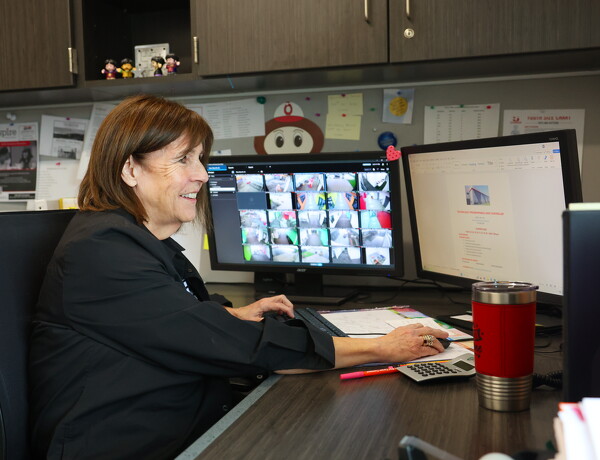
Marcia Helentjaris, Tri Star's adult education and career development coordinator, will retire at the end of June.
CELINA - A leading area educator and administrator who helped shape the career trajectory of countless students and even adults at Tri Star will retire at the end of June, taking with her a treasure trove of institutional knowledge and good memories.
Though she bears the title of career development and adult education coordinator, Marcia Helentjaris has adopted many roles over nearly four decades, including those beyond the boundaries of her official capacities. She did whatever it took to help make the then fledgling career technical school a success.
"Larger schools had an entire staff for career development, whereas Marcia was the only person and she worked with all nine of our schools," said Tri Star Director Tim Buschur. "She has a wealth of institutional knowledge of all of Tri Star, not just career development."
Celina, Coldwater and St. Marys school districts formed Tri Star on March 31, 1983. Eventually Fort Recovery, Marion Local, Minster, New Bremen, New Knoxville and St. Henry also joined to make up the nine school districts in Tri Star today.
"She was at the ground level when Tri Star started and has seen how it has evolved over the years," Buschur continued. "She was willing to help with anything that needed to be done, even if it was not in her job description. She was a huge asset to me when I started at Tri Star since I had very little career tech experience. Like everyone at Tri Star, she stepped up to do what was needed to get the job done."
Helentjaris got her foot in the door at Tri Star as a substitute teacher for adult students in 1986 before transitioning the next year to the director of the short-lived, state-funded New Frontiers program, geared at getting adults who were unemployed for at least two years back into the workforce.
"I recruited 20 adults who agreed to work on employability, life skills and career training," Helentjaris told The Daily Standard. "Some students also worked on obtaining their GED and received services through adult basic education. The students attended five days a week from February to June after which they graduated."
Once funded ended for New Frontiers, Helentjaris assumed a new role - vocational evaluator.
"I provided assessments to companies who were hiring new workers, as well as employees who were interested in changing positions within the companies," she said. "I also assessed all people in Mercer and Auglaize Counties who were receiving federal aid."
Also, from 1987-1996, Helentjaris was director of Intervention Academy, a program for high school students who were at risk of dropping out or who had recently quit school. The students were given an opportunity to obtain their GED or get the extra help they needed to cross the finish line with a diploma.
In 1996, Helentjaris embraced career development.
"I continued to be the vocational evaluator while also adding career development after the state mandated career development for all students K-12," she said. "I was responsible for providing support and guidance to all our nine districts to assure they were in compliance with the newly mandated 'career passport' for all program."
State funding for career development at one point was cut, but area superintendents thought it was too important a focus to fall to the wayside and arranged for school districts to pick up the cost.
"One of the best examples of how important she was to Tri Star is when the state cut career development funding years ago. The superintendents at the time continued to fund her position," Buschur said. "They felt the position was still needed."
This happened to be a very difficult time for many workers, due to the shuttering of Huffy Bicycle plant in Celina and New Idea in Coldwater.
"Back then … you could only be on assistance half a year and then they put money into retraining, so we had a lot of companies that needed to have people retrained," Helentjaris recalled. "I did vocational evaluation back then. We did assessments, we worked … with children's services, adult services, so we came in during that time when jobs, unlike now, were hard to get."
Area voters at a special election in August 2016 approved a 15-year, 0.95-mill bond levy to construct a new $25 million, 101,170-square-foot, two-story Tri Star complex on State Route 703. The state-of-the art facility opened its doors to students in August 2019.
The complex consolidated Tri Star's programs under one roof with 19 classrooms and laboratories.
Helentjaris retired in 2018 and was then rehired part-time as career development and adult education coordinator.
"Besides assisting students of all grade levels, she has really helped adult programming to thrive," Buschur said. "One of the goals at the new facility was to provide more adult programming. She has done that, even drawing students from almost an hour away to take courses at Tri Star."
Tri Star Adult Education has welding, FANUC Robotics and Computer Numerical Control Machining classes.
"The interesting thing, I think, is that there are companies that pay for their associates to come. But more than half of that (welding) class is with people who just want to learn the skill of welding," Helentjaris said. "So they're new into welding, they'll be new into the job force. And I just think that that's kind of where we want to be, bringing new people in to get them going."
Welding is only a 30-hour class, with courses scheduled in the evenings.
"It's not a long commitment," she said. "A lot of these guys are getting off work and then coming right afterward. Our teachers are doing the same. So our teachers work a different job during the day and then they come out at night."
Tri Star limits the welding class to 10 students and charges $600 for the entire course.
"That's the other advantage of a short-term class - the commitment," she said. "It's $600, but it's not so expensive that you can't maybe come up with $600 to pay for a class."
And if a student finds out welding isn't for them, they're only out $600.
"It's just to pique people's interest," she said. "Some are waiting for a different job. Some of these people that I spoke to are trying to get a maintenance job within the company where they are, because that's just another skill that they need."
Since its formation in 1983, Tri Star has evolved from being a provider of vocational education with a certain type of student in mind to a sophisticated, multifaceted career and technical institution preparing area youth for college and careers.
Helentjaris takes great pride in Tri Star's growth and how area attitudes toward career education have shifted.
"When I started it had a bad reputation: If you weren't going to college, then you're going to career tech school," she said. "That (came) full circle where we have a lot of kids that are going to college as well as coming to Tri Star and the acceptance of the community. We had so many levies that failed, six levies that failed back in the '70s, that the communities would not vote for a Tri Star building."
Tri Star, she said, has become much like the popular kids' table.
"When we open it up for positions here you get a flood of people who want to come out and teach now. So that's a change, and that is wonderful. The students are great. We have lots of classes that have wait lists," she said.
Today, Tri Star is meeting the needs of students and area employers, whom play an active role on advisory committees informing programing and classes.
"I just think we're filling that need," she said. "That's probably as gratifying as anything. We are filling the need in the community."
For instance, Tri Star Adult Education will be offering a new class this June - Programmable Logic Controller.
"Robotics is very popular. The person (Nathan Huber) who's going to be teaching this works for Crown. He knows robotics, he also knows there's a demand for PLC," Helentjaris said.
Mandy Diller, Tri Star's teaching professions instructor and FCCLA advisor has been selected to take over Helentjaris' position.
"She will continue all the adult ed and then she will also expand all the career development, which will be activities. She'll take students out into the home schools," Helentjaris said. "In the fall, some of our students took engineering STEM kids into elementary schools and worked with them. It's that kind of thing, they'll work with the students and expose them at different ages to all the stuff that they could get out here."
